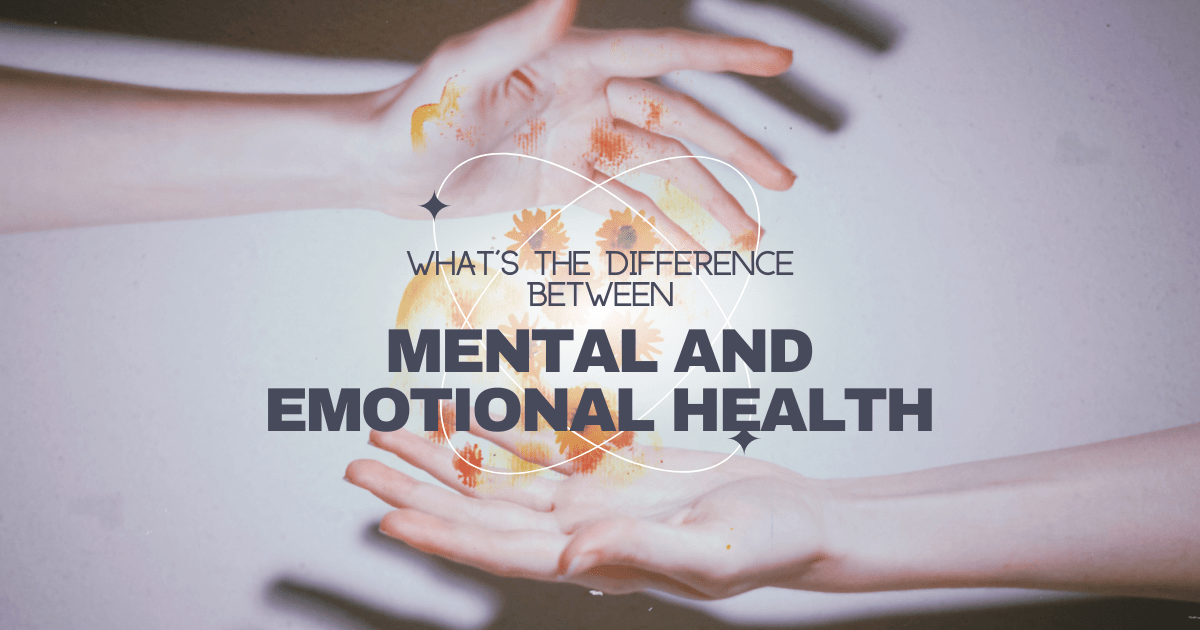People are complex, and a “holistic” approach to health means taking care of our physical, mental, and emotional health. But what is the difference between mental and emotional health?
The terms mental and emotional health are often used interchangeably, and while they relate, there are distinctions. So what is the difference between mental and emotional health, and how can we ensure we’re taking care of both?
Before we can answer “what is the difference between mental and emotional health,” it’s helpful to understand each on its own.
What is Emotional Health?
Your emotional health refers to how you think and feel. When we’re emotionally content, we can cope with events and stress in our lives in productive ways and manage our emotions.
How you feel affects relationships, activities, and your general mental condition.
If you can adapt to different situations successfully in your life and deal with the stressful things that happen, you can be said to have optimal emotional wellness.
Ways that you can facilitate good emotional health include:
- Change your outlook. When you’re someone with emotional wellness, you’re better able to bounce back from tough times, which is called resilience. Emotional wellness also means you can hold onto positive feelings for longer and appreciate good times in your life.
- Reduce your stress. We all feel stress sometimes, but if you constantly feel like you’re on high alert, that’s chronic stress. Learn how to cope with stress in healthier ways.
- Get plenty of sleep. Sleep affects our emotional, mental and physical wellness. You’re better equipped to handle stress, think more clearly, and focus when you get enough rest.
- Be present and mindful. Learning to be mindful can be empowering for your emotional wellness. When you’re mindful, you know what’s going on around you and inside you, but you’re not fixating on the past or the future.
- Build strong relationships. Social connections can help your mental and emotional well-being. When we connect to other people in meaningful ways, it can also promote better physical health.
What is Mental Health?
Mental health is broad, and it can include aspects of emotional health also.
However, there is more to consider for this topic.
- Our mental health is also our psychological and social sense of well-being, and it affects how we think and feel our behaviors and deal with stress.
- Mental well-being impacts how we relate to other people and our relationships and make important decisions.
- It’s important in every part of our life, starting in childhood and continuing through adulthood.
If someone experiences a mental health issue, it will affect every area of their life in most cases. The factors contributing to mental health problems and issues include biological factors, like our brain chemistry, genetics, and life experiences. For example, if you experience abuse or trauma in your life, you may be more likely to have mental health issues or develop a mental disorder. Having a family history of psychiatric disorders can also affect your mental health.
- An estimated 1 in 5 adults in America experiences mental illness in any given year.
- One-in-20 U.S. adults will experience a serious mental illness every year.
- Among young people between 6 and 17, the rate of mental health disorders is 1 in 6.
Having a mental health condition doesn’t occur because of one event. Instead, multiple factors converge. This doesn’t mean you’ve done something wrong or that someone in your family has.
It’s also important to know mental illness and mental health disorders are very treatable. The sooner you seek treatment, the better the outcomes tend to be.
Mental Health Conditions
Some of the more commonly diagnosed mental disorders include:
- Anxiety disorders: While everyone experiences anxiety occasionally, it affects your functionality and ability to do everyday things when you have a disorder. More than 40 million adults in the U.S. have an anxiety disorder, making them the most common mental condition. There are subtypes of anxiety disorders, including generalized anxiety disorder, social anxiety disorder, and panic disorder.
- Bipolar disorder: This psychiatric disorder creates dramatic swings in someone’s mood and energy levels and their ability to think clearly. If a person has bipolar, they’ll have high moods, known as mania, and low moods, known as depression.
- Borderline personality disorder: BPD includes trouble regulating moods and emotions. Someone with BPD might have intense emotions, and it’s difficult for them to get back to a stable mood after something emotionally triggering happens.
- Depression: Also known as depressive disorder, symptoms can vary depending on the person, but they affect the day-to-day function, typically lasting more than two weeks. Some of the more common depression symptoms include sleep and appetite changes, loss of energy, problems concentrating, hopelessness, and feelings of guilt.
- Eating disorders: Anorexia and bulimia are two more commonly diagnosed eating disorders. Eating disorders are defined by an extreme preoccupation with food and weight issues. Untreated eating disorders can lead to serious medical complications and potentially death.
- Obsessive-compulsive disorder: OCD includes repetitive and unwanted intrusive thoughts and obsessions. Compulsions also occur, which are urges to do certain actions. These compulsions are meant to relieve the distress the obsession creates temporarily.
- Post-traumatic stress disorder: PTSD stems from exposure to traumatic events like military combat, assault, or accidents. PTSD symptoms often occur with other conditions, including substance use disorders and depression.
Discover the Difference Between Mental and Emotional Health
To go back to our original question—what is the difference between mental and emotional health?
They are distinct but very much related concepts.
- Our emotional health is one part of our mental health, but not all of it.
- With mental health, there are diagnosable conditions that someone may have. For example, an online self-diagnosis of mental health could reveal that you have symptoms of depression or anxiety.
- There aren’t diagnosable emotional health conditions, by contrast.
- To improve emotional health, you can do many things on your own. Implementing general lifestyle changes can make you more resilient and emotionally satisfied.
- When you have a psychiatric disorder, while lifestyle changes might help your symptoms, you need a proper diagnosis and treatment from a mental health professional. The treatment for mental health disorders can include talk therapy, such as cognitive-behavioral therapy (CBT), and sometimes medications.
Contact Story Wellness today at (866) 476-2823 if you’d like to explore how you can improve your emotional wellness or receive treatment in California for any mental health disorder.





